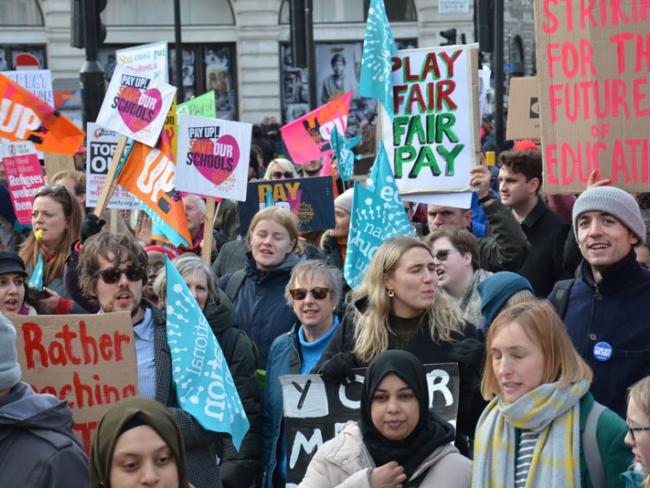
London, February: teachers take to the streets during their pay fight. Photo Workers.
This year and last many workers have taken up the fight for better pay and conditions. For some, like rail workers, this has been the latest step in long running disputes over the future of their industry as well as pay.
Others, such as health workers, have taken action because they felt they had little choice in the face of steep inflation and negligent employers, with the government pulling the strings in the background.
And it’s not just the public sector – all over Britain workers have exercised their strength in the workplace in defence of their standard of living and conditions of employment.
These disputes have in many cases resulted in a degree of success, especially on pay. But even those struggles have for the most part not kept up with inflation – the rising cost of housing, food, energy and transport. Real wages have fallen.
‘Government and employers seemed unprepared for this upsurge. Maybe they believed their own rhetoric about the lazy, stupid working class…’
Government and employers seemed unprepared for this upsurge. Maybe a negative view of workers led them to disparage the potential to organise with discipline, ingenuity and flexibility. Or maybe they believed their own rhetoric about the lazy, stupid working class.
Certainly the ruling class and its government underestimated the power of collective thought and action. But they are catching up fast – to be expected: don’t count on their continuing ineptitude or underestimate their determination to reassert control.
No worker really thinks that one year’s success ends the necessity for future defence of pay. Talk of long-term pay structures and future arrangements is no more than an acknowledgment of the balance of strength – the terms of a truce, not a final resolution.
Yet perpetual, unending strikes are not the answer either. Life must go on, bills paid, respite taken. Continuing action when support for a dispute is waning wastes and dissipates strength for the sake of short-term glory. As if somehow success will be permanent, if only everyone will hang on.
Ebb and flow
Disputes rarely end neatly in this never-ending, but ebbing and flowing, confrontation between workers and capitalists. Differences between groups of workers come to the surface again. Some feel they could have achieved more, others that they have lost too much for too little gain. But only those involved can come to a collective decision about settlement or not.
Even with many of those involved being new to industrial action, workers in recent disputes have frequently shown they understand when to take gains and when to call the employer’s bluff. Overwhelmingly votes for action have been solid (neutering the aim of anti-union laws).
The government has misjudged the mood of the general public too. They are also workers, and suffering from inflation and poor working conditions. They understand why other workers are fighting for better wages, even if inconvenienced and not themselves in dispute.
Inflation
Above all, no one is buying the lie that workers’ pay rises cause inflation. That’s been unavoidably clear, even to ministers. They are now trying the line that they have no choice but to hold down wages otherwise economic prospects will be grim. There is no sign that anyone is swallowing that either.
The number of strikes is at its highest for several years. But that’s only part of the story. In the health and transport disputes, and others too, workers are consciously fighting not only for pay, but for the future of their sector. It’s a battle for control: to serve the needs of the British people, not the needs of capital.
As with struggles for pay, there are no permanent guarantees for the future of any industry. Success depends even more on ingenuity, solidarity and tactical nous.
Let’s reject the blind alleys of waiting for a change of government, or nationalisation. And reject the idea that globalisation and immigration are the answer.
Demands for the future need to start with an analysis of the needs and shortcomings of each sector. What’s failing, how can that be overcome, and so on.
Such a lead – even from just one sector – will encourage workers across the whole of Britain to take up the call for an assessment of our national needs. And then the fight for the future can really begin.
